 I used to consider my husband to be an egg fanatic. When I met him, it was disconcerting to me how often he ate eggs. I was never a regular breakfast eater, but every morning after I'd stayed at his house, he'd make us fried eggs, half a bagel, and some coffee. I kind of liked the routine, but when we started living together, I was worried about eating so many eggs every week. "High cholesterol!" I'd exclaim. Some nights when I worked late or went out with friends, I'd find the tell-tale signs of fried eggs in the pan. "Did you eat fried eggs again?" I would ask, accusingly. Depending on his mood, he'd reply sheepishly that he'd been caught, or he would lodge a defense of eggs. In the lean years, he explained, he'd eat mai fun noodles from the corner Chinese place almost every evening for dinner--with a fried egg on top. He plays sports and swears that oatmeal with a fried egg on top is the perfect breakfast before a game.
I used to consider my husband to be an egg fanatic. When I met him, it was disconcerting to me how often he ate eggs. I was never a regular breakfast eater, but every morning after I'd stayed at his house, he'd make us fried eggs, half a bagel, and some coffee. I kind of liked the routine, but when we started living together, I was worried about eating so many eggs every week. "High cholesterol!" I'd exclaim. Some nights when I worked late or went out with friends, I'd find the tell-tale signs of fried eggs in the pan. "Did you eat fried eggs again?" I would ask, accusingly. Depending on his mood, he'd reply sheepishly that he'd been caught, or he would lodge a defense of eggs. In the lean years, he explained, he'd eat mai fun noodles from the corner Chinese place almost every evening for dinner--with a fried egg on top. He plays sports and swears that oatmeal with a fried egg on top is the perfect breakfast before a game.Years have passed, both of our cholesterol levels are just fine (I insisted he have his checked!), and I feel differently about eggs. There've been conflicting studies about the effect of egg consumption in healthy adults. Some have even called it the perfect food because of it's nutritional properties. According to wikipedia: "They supply all essential amino acids for humans,[21] and provide several vitamins and minerals, including vitamin A, riboflavin (vitamin B2), folic acid (vitamin B9), vitamin B6, vitamin B12, choline, iron, calcium, phosphorus and potassium. They are also a single-food source of protein."
And you know what? I love eggs, too. I love omelets (which we make at least once a week), scrambled eggs, egg-drop soup, poached eggs (which I never even knew about until I went to London), eggs in fried rice, egg custard, deviled eggs, and hard boiled eggs at easter time with a little bit of mayonnaise and salt. In fact, I like hard boiled eggs all the time. A friend of mine was traveling in Africa once and packed a dozen eggs with her for snacks on the road. I actually don't know whether hard boiled eggs would keep while you're hiking in the heat for a week, but she swore that they survived the journey well and provided quick and easy energy.
These days, I especially love the eggs that my husband cooks perfectly and puts on top of the flax-oat sourdough bread that I make, with a few strips of smoked salmon. But I use hard boiled eggs a lot, too--both as a good travel breakfast on the train when I'm totally busy or chopped up on salads for lunch. We've started buying cage-free eggs (organic and/or from local farms when we can afford it) because of all of the horror stories about egg production. I still don't know whether to trust the "cage-free" label on the eggs we get at Fairway or Trader Joe's, but I have to think they're somewhat better than the 99 cent eggs in the styrofoam container. There have been a few articles about the topic, but I haven't quite figured it out yet.
Unfortunately, I've found that the better the egg, the harder time I've had peeling them. I used to be an expert egg peeler at Eastertime, but these days, I'm lucky if I get 3/4 of the egg I started with after peeling away strips of rubbery egginess with the shell. I found this recipe for cooking eggs to perfection, and I hope my egg-wasting days are over. The recipe recommends using eggs that are not fresh, 3-5 days old are the best. In contravention to everything I've ever thought, the recipe also tells you to not add salt to water, explaining that the salt will raise the boiling point of the water making the egg whites rubber.
How To Correctly Cook Hard-Cooked (Hard-Boiled) Eggs
Bring your eggs to room temperature before cooking. If the egg has been stored in the refrigerator, it can be warmed gently under a flowing hot tap water or sit at room temperature for 20 to 30 minutes. By bringing the eggs to room temperature, they're much less likely to crack in the hot water. Also the temperature of the egg at the start of the cooking process will affect the cooking time.
Choose the right size pot to cook your eggs in: The eggs must not be stacked but be in one (1) layer only. Gently place the eggs in a single layer in a pan with enough cold water to cover eggs completely (approximately by 1 inch of water over the top of the eggs).
Over high heat, bring water JUST to a rapid boil. As soon as the water reaches a rapid boil, remove pan from heat and cover egg pan tightly with a lid.
Set timer for 17 minutes for large eggs or 20 minutes for jumbo eggs. After 17 or 20 minutes (depending on size of your eggs), remove lid and drain off water from the eggs.
Watch the time when cooking the eggs carefully. Overcooking causes a green layer to form around the yolk. This layer is caused by a reaction between the iron in the yolk and the sulfur in the white. Heat speeds up this reaction, so the longer your eggs cook, the greater the chance of discoloration.
IMPORTANT - Stop the cooking process - Residual Heat or "Carry Over Heat."
After the eggs are removed from the heat, some cooking will continue, particularly the yolk of the egg. This is due to residual heat called “carry over cooking,” For this reason, transfer the eggs to the bowl of ice cubes and/or cold water. While they're in the cold water, a layer of steam develops between the shell and the egg white. The steam helps make peeling an egg much easier.
Let eggs cool at least 10 minutes in cold water, then drain. Either store in refrigerator or peel the eggs.
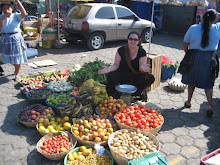



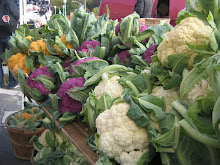


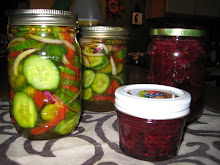
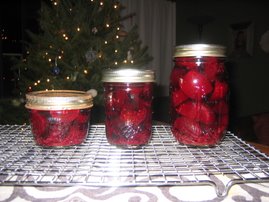




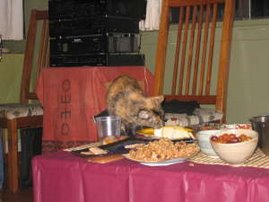
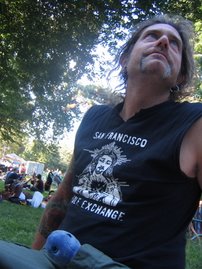
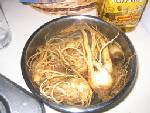
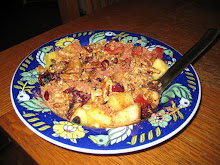
1 comment:
Mmmmm. Eggs! I agree that I need to watch out how often I eat them, but they are terrific!
In Thailand, it is very popular to add an egg to your rice porridge. They just crack it right into the porridge (which is ordinarily seasoned to be very spicy).
xox
Donald
Post a Comment